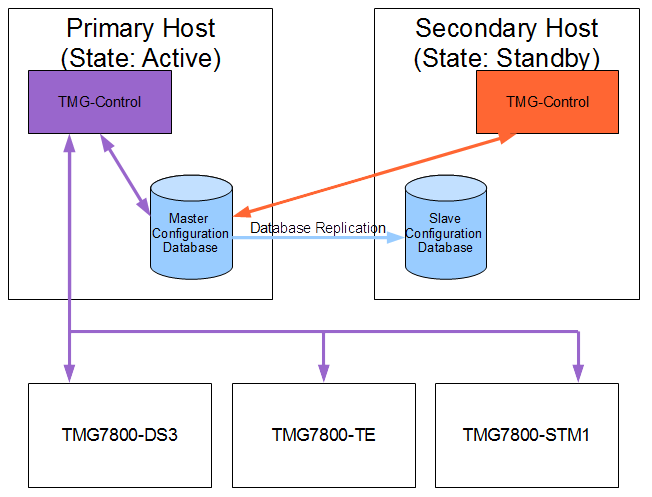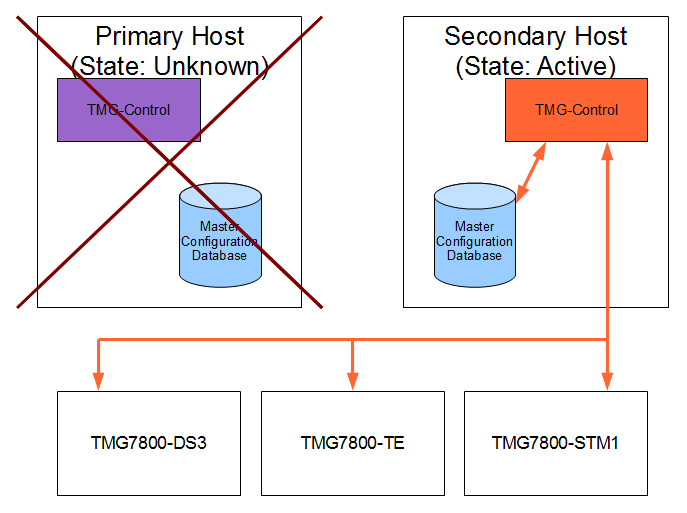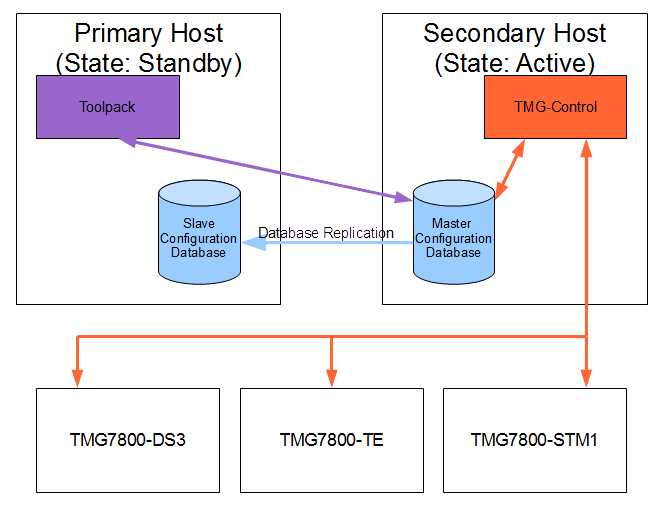High Availability:Hardware:Hosts
(add pictures to explain the host redundancy feature) |
m (reformat to be more pleasant to the eye) |
||
| Line 5: | Line 5: | ||
[[Image:host_redundancy_original.png|widthpx|Host redundancy original state after a new installation]] | [[Image:host_redundancy_original.png|widthpx|Host redundancy original state after a new installation]] | ||
| − | If the primary host is lost, two high availability mechanisms will be | + | |
| + | If the primary host is lost, two high availability mechanisms will be activated: | ||
| + | * [[Active/Standby|standby]] Toolpack will become [[Active/Standby|active]] | ||
| + | * [[Master/Slave|slave]] database will become [[Master/Slave|master]]. | ||
| + | This will allow the system to keep functioning without manual operation (note that [[Transient Calls| transient calls]] will be lost during the switchover), as illustrated in the following picture. | ||
[[Image:host_redundancy_primary_lost.png|widthpx|Host redundancy state after losing the primary host]] | [[Image:host_redundancy_primary_lost.png|widthpx|Host redundancy state after losing the primary host]] | ||
| + | |||
When the primary host is recovered, the [[Active/Standby|active]] Toolpack system and the [[Master/Slave|master]] database will stay on the secondary host. | When the primary host is recovered, the [[Active/Standby|active]] Toolpack system and the [[Master/Slave|master]] database will stay on the secondary host. | ||
[[Image:host_redundancy_primary_recover.png|widthpx|Host redundancy state after the recover of the primary host]] | [[Image:host_redundancy_primary_recover.png|widthpx|Host redundancy state after the recover of the primary host]] | ||
| + | |||
NOTE: The database and host redundancy mechanism are two separate features, meaning that a database switchover will not necessarily cause a host switchover as well. | NOTE: The database and host redundancy mechanism are two separate features, meaning that a database switchover will not necessarily cause a host switchover as well. | ||
Revision as of 13:11, 9 September 2010
The hosts are another critical module of TelcoBridges solutions and hosts redundancy will greatly improve the high availability and reliability of your system.
Here is an example of a redundancy host setup:
If the primary host is lost, two high availability mechanisms will be activated:
This will allow the system to keep functioning without manual operation (note that transient calls will be lost during the switchover), as illustrated in the following picture.
When the primary host is recovered, the active Toolpack system and the master database will stay on the secondary host.
NOTE: The database and host redundancy mechanism are two separate features, meaning that a database switchover will not necessarily cause a host switchover as well.
Recommended Setup
Recommended Hardware
- Recommended host hardware components TMP7950 data sheet.
- Dual power supplies is a huge plus
- The number of network interface needed by a system is application specific, but for TelcoBridges products at least 2 independent network interfaces is needed for controlling the Tmedias and another one to connect to the management network.
Warnings
- IP Teaming/ IP Bonding - TelcoBridges Hardware doesn't support IP Teaming (Ip Bonding). TelcoBridges products can't work with the host configure with Ip Teaming in the system. TelcoBridges products uses 2 network interfaces to achieve the same goal.
- RAID - It is highly recommended to disable BIOS RAID on the motherboard. Use software RAID instead, also known as MD RAID.


